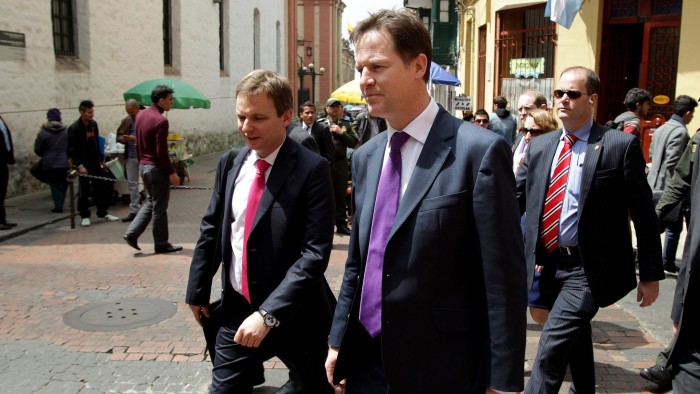Nick Clegg seeks stronger ties with Latin America

Roula Khalaf, Editor of the FT, selects her favourite stories in this weekly newsletter.
Since airlines on both sides of the Atlantic halted their London-Bogotá route a decade ago, stopovers in Frankfurt, Madrid, Paris or Miami have meant a bumpy ride for British business visitors to the Colombian capital.
But as the UK pledges to turn around a history of “early leadership and subsequent neglect” in Latin America – as Nick Clegg put it during a trip to Colombia and Mexico – that is set to change.
While the deputy prime minister was in Colombia, Avianca, the Andean country’s largest airline, said it would restart flights to London this year. In turn, the British government will cancel the transit visa requirement for Colombian citizens.
The UK is focusing on strengthening long-term ties with strategic emerging powers such as Brazil as well as Colombia, Mexico and Chile, founding members of the Pacific Alliance, a growing regional free-trade bloc.
Speaking to the Financial Times in Mexico, Mr Clegg said the UK had “a legacy of falling behind our European competitors [in Latin America] over a long period of time and we’re not going to turn this around overnight”.
But he added: “We’re making a lot of progress here . . . I particularly emphasise the commonality in values in economic terms between ourselves and the Pacific Alliance – these are outward-facing trading nations and they are very comfortable with our general economic philosophy.”
Mr Clegg is the most senior UK official to visit Colombia in two decades and also led Britain’s largest trade delegation to Mexico. That country’s landmark energy reform opens the sector to private investment after 75 years under state control and offers a wealth of prospects for UK companies, including oil majors like BP and Shell.

“I think it’s difficult to exaggerate the significance of this very brave reform by President [Enrique] Peña Nieto because he is opening up the potential for collaboration [especially] in an area where the British energy sector excels – deep water exploration,” Mr Clegg said, before talks with the president and Emilio Lozoyo, head of Pemex, the state oil company.
“The UK has established a successful fiscal regulatory system for that challenging deep sea exploration which might act as a model,” he added. “It’s certainly not about us finger wagging and pretending we have all the answers, but I am here . . . in a spirit of partnership.”
William Hague, the British foreign secretary, visits Colombia this month, focusing mainly on the peace process between the government and leftist rebels of the Farc. But the UK is keen to see commercial opportunities grow out of the long and deep security relationship dating back to the early 1980s.
“In Colombia, there is a shift from just purely co-operation on defence, anti-narcotics, and human rights. We are moving forward from security diplomacy, which will remain strong, but with a much greater focus on commercial diplomacy and prosperity,” says Andrew Wright, chief executive of the newly established UK-Colombia Trade body.
Britain is the second-largest overseas investor in Colombia with $6bn invested in less than a decade. Between 2009 and 2012, UK exports were up by more than 125 per cent – more than with any other emerging economy. UK exports to Mexico rose 9 per cent last year but Mr Clegg said: “They could be so much more.”
Comments